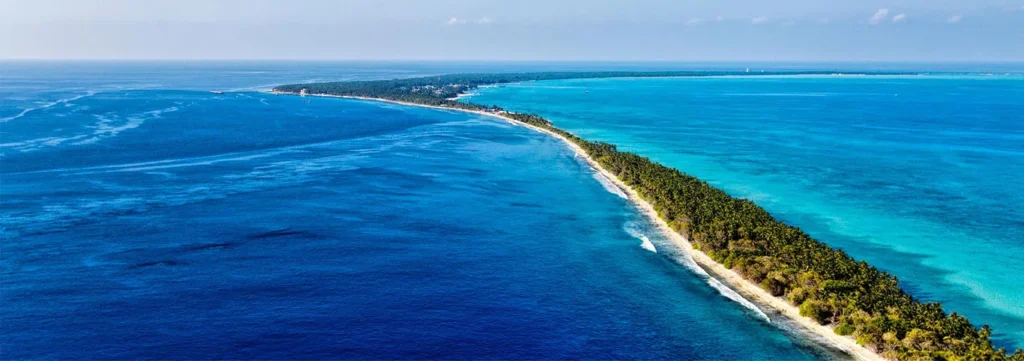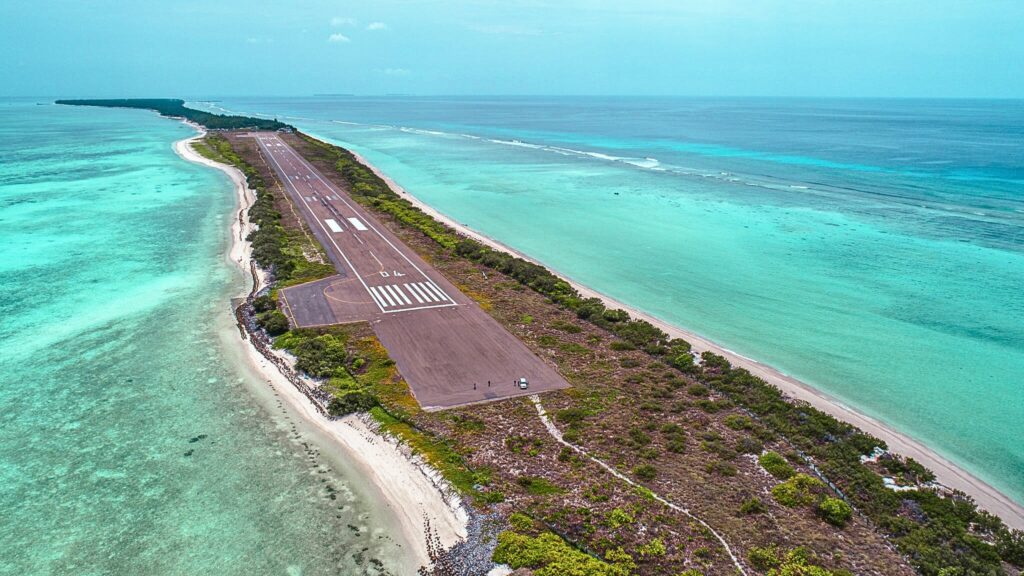
In a surprising turn of events, Lakshadweep, India’s smallest Union Territory, has found itself in the spotlight, becoming a trending topic on Google and igniting discussions that stretch beyond its serene shores. The catalyst for this sudden fame? Prime Minister Narendra Modi’s recent visit to Lakshadweep, where he not only enjoyed the pristine beaches but also encouraged Indians to explore the beauty of this hidden gem.
Lakshadweep’s Emergence on the Tourism Map
Following Prime Minister Modi’s visit, Lakshadweep swiftly rose to the top of Google trends in India for two consecutive days. This surge in interest fueled speculations that Indians might be considering Lakshadweep as their next preferred tourist destination. The breathtaking visuals shared by the Prime Minister showcased the stunning beauty of the islands, from tranquil beaches to vibrant marine life.
However, the unintended consequence of promoting Lakshadweep as a beach destination seems to have triggered a reaction from the people of the Maldives, a well-established holiday hotspot for many Indians.
Social Media Backlash and Diplomatic Tensions
Shortly after PM Modi’s visit, some Maldivians took to social media, launching the hashtag “#VisitMaldives.” This apparent counter-campaign emerged as a response to what they perceived as India’s attempt to divert tourism attention from the Maldives to Lakshadweep.
The situation escalated when derogatory remarks against PM Modi surfaced from Maldivian leaders, turning the matter into a diplomatic row. These comments not only fueled tensions but also raised concerns about the potential impact on the Maldives’ economy, heavily reliant on tourism.
India’s Push to Boost Tourism

The Indian government’s efforts to boost tourism have been evident in various initiatives. PM Modi, known for promoting domestic destinations, has been actively endorsing India’s picturesque locations. Lakshadweep is just the latest in a series of destinations that have received the spotlight.
Earlier, Diu, an island near the coast of the Kathiyawad region, hosted the Beach Game Festival, showcasing the potential for beach tourism. Similarly, the Administrator of Union Territories of Dadra and Nagar Haveli expressed confidence that beach games would not only enhance local culture but also attract tourists.
PM Modi’s advocacy for destination weddings within India, labeled as “Wed in India,” further demonstrates the government’s commitment to keeping celebrations within the country. This approach aims to retain financial resources domestically and promote local tourism.
Maldives’ Apprehensions and Political Backlash
The Maldives, already a preferred destination for Indian tourists, expressed concerns about the potential impact of Lakshadweep’s rising popularity. The fear of competition in attracting tourists prompted some Maldivian leaders to voice their reservations, with suspicions that India was positioning Lakshadweep as a direct alternative to the Maldives.
Certain Maldivian political figures went beyond expressing concerns, resorting to derogatory comments against PM Modi. This not only added fuel to the diplomatic fire but also raised questions about the appropriateness of such statements in international relations.
The Importance of Indian Tourists for the Maldives
The significance of Indian tourists for the Maldives cannot be overstated. With lakhs of Indians visiting the Maldives annually, they constitute a substantial portion of the tourist influx. In recent years, over 2 lakh Indians visited the Maldives annually, making them a vital contributor to the country’s tourism-driven economy.
Amid the growing tensions, former sports minister of the Maldives, Ahmed Mahloof, expressed deep concerns about a potential Indian boycott affecting the Maldives’ economy. Such a scenario, he noted, could have severe repercussions and a lasting impact on the nation’s economic recovery.
Diplomatic Fallout: Social Media Trends and Economic Ramifications
The diplomatic fallout between India and the Maldives found expression on social media platforms, with the hashtag “#BycottMaldives” trending in India. This online movement gained momentum as Indians shared their canceled travel plans to the Maldives and voiced their disapproval of the derogatory remarks made by Maldivian leaders.
This digital resistance was further manifested in actions taken by Indian travel companies. EaseMyTrip announced the suspension of all flight bookings to the Maldives as a gesture of solidarity with India. The decision aimed to prioritize national interests over business considerations and reflected a strong stance against disrespectful behavior.
MakeMyTrip reported a significant surge in searches for Lakshadweep, emphasizing a 3,400% increase in on-platform searches following PM Modi’s visit. The trending hashtag “#LakshadweepTourism” mirrored this newfound interest in exploring India’s own coastal treasures.
The Confederation of All India Traders (CAIT) also joined the chorus of disapproval, calling on domestic traders and exporters to refrain from conducting business with the Maldives. CAIT Secretary General Praveen Khandelwal emphasized that such offensive comments demanded a united response from the business community.
Maldives’ Damage-Control Measures
Realizing the severity of the situation, the Maldives government took swift action to contain the fallout. Moosa Zameer, the Minister of Foreign Affairs of Maldives, disapproved of the offensive remarks against foreign leaders, asserting that they did not reflect the official position of the Maldivian government.
The government further announced the suspension of three deputy ministers who had criticized PM Modi for allegedly projecting Lakshadweep as a competitor to the Maldives. This internal disciplinary measure aimed to demonstrate the government’s commitment to maintaining positive relations with neighboring countries.
| Aspect | Lakshadweep | Maldives |
|---|---|---|
| Geographical Charms | Nestled off the southwestern coast of India, 36 islands and islets | Situated southwest of Sri Lanka and India, 26 atolls |
| Governance Galore | Administered as a union territory of India | A sovereign nation with its own government and President |
| Cultural Kaleidoscope | Influenced by Indian traditions, vibrant festivals, traditional music, and dance forms | Unique blend of South Asian, Middle Eastern, and African influences, shaped by Islam, traditional music, dance, and festivals |
| Tourism Tales | Renowned for pristine beaches, vibrant coral reefs, and rich marine biodiversity | International tourist magnet, overwater bungalows, crystal-clear turquoise waters, and dynamic coral reefs |
| Location | Off the southwestern coast of India | Southwest of India, approximately 1,000 kilometers from Kochi |
| Independence | Union territory of India | Gained independence in 1968, sovereign nation since 1968 |
| Languages | Predominantly influenced by Indian traditions, festivals, and languages | Dhivehi and English, influenced by South Asian, Middle Eastern, and African traditions |
| Flight Connectivity | Flights to Lakshadweep are less frequent | Abundant flights from India to Maldives |
| Visa/Permit | Permit required to go to Lakshadweep | No visa required for Maldives, a permit is required for Lakshadweep |
| Population | Smallest union territory with a smaller population | Population around 400,000, diverse culture influenced by various traditions |
| Sea Level Threat | Potential threat due to changing weather patterns | Facing the risk of rising sea levels due to changing weather patterns |
| Tourist Statistics | Approximately 25 thousand tourists visited last year | Indians make up the largest number of visitors, with around 3 lakh in 2021, 2.5 lakh in 2022, and 2 lakh in 2023 |
| Major Attractions | Pristine beaches, coral reefs, and marine biodiversity | Overwater bungalows, clear turquoise waters, vibrant coral reefs |
| Travel Time | One-and-a-half-hour flight from Kochi | Flights from India, with travel time around 2 hours to Maldives |
| Ideal Visit Time | Tourism gradually developing, ideal for those seeking quieter retreats | Popular tourist destination, ideal time to visit from January to April |
Conclusion: Navigating Diplomatic Waters
As the diplomatic waves continue to ripple between India and the Maldives, the incident serves as a reminder of the interconnectedness of tourism, diplomacy, and international relations. Lakshadweep, initially intended to shine as a tourist haven, inadvertently became entangled in a web of diplomatic tensions.
The episode underscores the delicate balance that nations must strike when promoting their own attractions without inadvertently overshadowing or antagonizing neighboring destinations. The importance of diplomatic finesse in an era of global connectivity cannot be overstated, and both India and the Maldives must navigate these waters carefully to preserve their longstanding ties.
In the end, the beauty of Lakshadweep and the allure of the Maldives remain untouched by diplomatic currents, and both destinations continue to enchant travelers seeking the magic of sun-kissed beaches and azure waters.